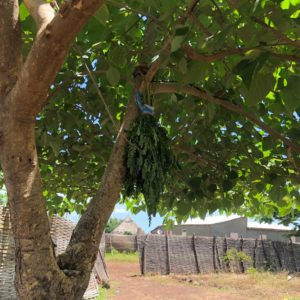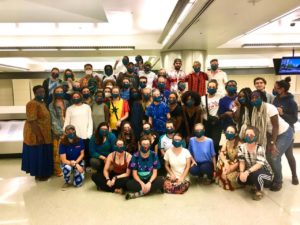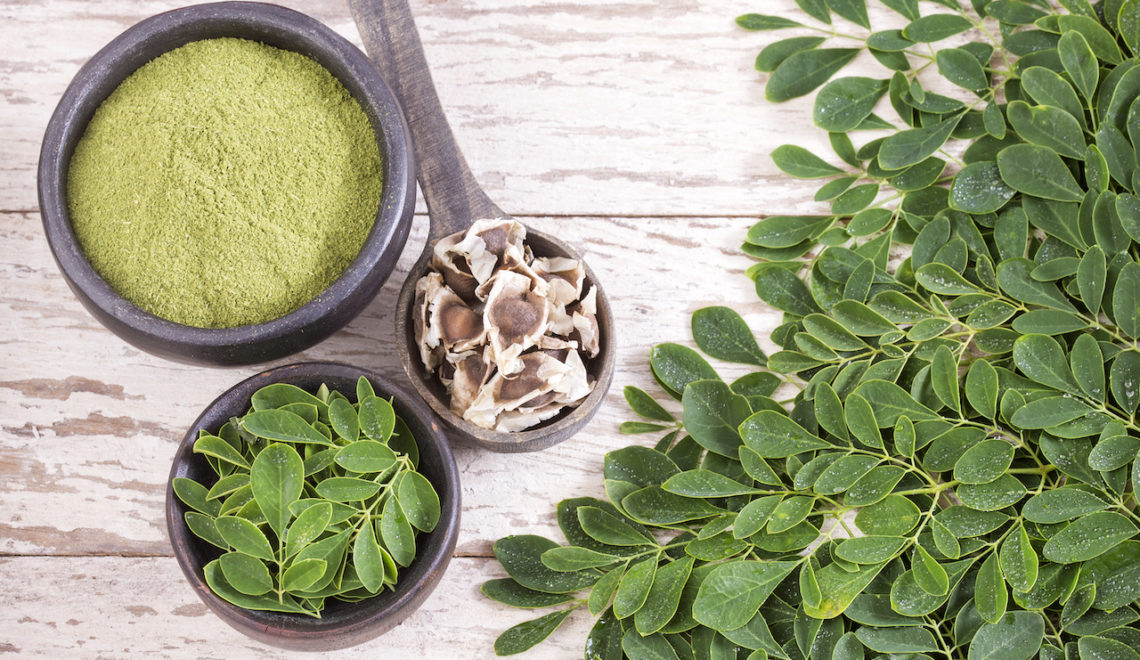Throughout the country of Senegal, about 36 languages are spoken within at least 20 ethnic groups. However, when someone mentions the little green leafed plant, “nebeday,” the word is almost universally known. Why? Because “nebeday never dies.”
Nebeday, or moringa, is famous across Senegal.
Nebeday is a highly nutritious medicinal plant that can grow almost anywhere. It thrives nearly everywhere—from the flat and sandy deserts of the north, to the cool coastal regions, and even to the mangroves and waterfalls of the humid south.
Moringa trees line the classrooms of the Peace Corps training center in Thiès, Senegal. The seeds, leaves, and pods of these trees are used by volunteers in sectors of agriculture, health, and economic development. Volunteers and trainees pass these trees every day as they attend and lead sessions on cultural integration, Peace Corps policies, and technical field training.
Volunteers and Senegalese national counterparts work together to incorporate innovative ways to help local communities sell the leaves, either in cooked dishes or as a nutritious powder. Throughout Senegal, moringa is sold in local markets and even exported overseas.
My Moringa Peace Corps Journey
Peace Corps volunteers help in several ways. One way is to guide communities in planting moringa intensive beds in households and community gardens. The health benefits of the leaves—which contain essential vitamins, minerals, and proteins—are extremely valuable to communities. This is especially true now that local communities have increasing rates of diabetes, hypertension, and heart disease. These ailments are largely due to the increasing popularity of imports such as refined oil and sugar.
I arrived in Senegal as a Community Economic Development volunteer. I also arrived as a vegetarian with an active lifestyle and passion for nutrition.I knew that I wanted to incorporate moringa into my work and diet, but I didn’t know what that would mean yet.
When I arrived at my site—a village of 1000 people in the Kédougou region in the southeast of Senegal—I noticed that moringa trees were already present throughout the community. Many people add the leaves to a thick, nourishing sauce with other seasonal leaves, ground peanuts, onion, and spices.
This sauce is then poured over cornmeal couscous, made by pounding corn to a meal, steaming it three times over a charcoal or wood fire, and sifting in powdered baobab leaves.
Nebeday Trainings
Over the course of my service, with the wonderful guidance of my counterpart Adama Sidibe, a community women’s group leader, I offered trainings. These trainings for the community explored the health benefits of moringa, and how to make moringa into a nutritious powder. We also tried different methods of making moringa into juices and syrups by mixing pounded moringa leaves with ginger and local honey.
I also grew moringa trees in the backyard of my hut, and incorporated the leaves into my daily diet. It amazed me how much more energy and resilience to the heat I felt once I started eating moringa every day.
A breakfast item that you can find throughout Senegal is baguette with beans, peas, or egg. I would go to sandwich stands and add moringa leaves or powder to my sandwich, usually while explaining the health benefits to amused onlookers and sandwich makers.
I also popularized a (very hip) drink that I called a “moringa latte.” I made this in my hut on a gas canister stove, by mixing a spoonful of moringa powder with milk powder, sugar or honey, and hot water. It might have just been that I wasn’t near any coffee shops, but I truly thought the drink resembled a matcha latte! I also liked to sprinkle moringa on top of rice dishes, and on my oatmeal.
Abrupt Evacuation: I Had 48 Hours to Leave
When the decision was made to evacuate all Peace Corps Volunteers worldwide due to the COVOID-19 pandemic, I was devastated to leave my community a year earlier than expected. I had only 48 hours to say goodbye to my new family and friends that I had made during the year. Therefore, it was impossible to explain the evacuation situation adequately to counterparts on my unfinished projects.
I tried to travel to the US with a bag of moringa powder. I wanted to share it with my friends and family back at home. Since I always kept a bag of moringa powder in my backpack when I was traveling around Senegal (always prepared to come across a sandwich stand), I decided to put my moringa into my small backpack of carry-on luggage.
Unfortunately, the plastic bag exploded due to cabin pressure. I found myself in the bathroom by the baggage claim at the DC airport at 2am, frantically trying to clean up the mess. The suspicious green powder that now covered my kindle, sweatshirt, journal, pens—and entire interior of my backpack—might not be the most impressive to a customs officer.
I finished cleaning just in time to take a final (masked) group picture with my stagements. These are the volunteers I’d trained and served with for a year. After this picture, we left to our final destinations throughout the country.
Stumbling Upon Kuli Kuli
Back in California, I found myself missing my nebeday, especially in my oatmeal and smoothies. I was so excited when I saw Kuli Kuli’s powder at Whole Foods! Right away, I bought some and researched the company. I was amazed to see that Kuli Kuli was started by a Returned Peace Corps Volunteer. I also learned that Kuli Kuli supported local communities in African countries that grow moringa, by sourcing moringa from small local collectives.
As a Peace Corps Volunteer, I had the opportunity to see first-hand the empowerment and sustainable economic benefit this kind of project can have. Especially when done in a way that empowers community members. It’s great to see how a Peace Corps service can be made into a lifelong project that supports health and sustainability across the country and globe.
Closing Thoughts
Seeing companies like Kuli Kuli doing so well gives me inspiration and hope in these uncertain times. It is a reminder that sometimes things don’t go the way that you envisioned. But that doesn’t mean that you can’t still aspire to things or create goals.
It’s about adjusting to “what is” and making the most of what you find around you, wherever you are. My Peace Corps service was cut short. But that doesn’t mean it doesn’t have value to me now that I’m back in the US.
If we, as individuals, each choose to consciously follow a path guided by love and support for our own health and the health of our global communities, I believe that we, as a human collective, can come out of this time stronger and more together.
And eventually, we will be okay.
Many thanks to Emme S. for this personal piece, and for all of her Peace Corps work in Senegal.
Follow us @kulikulifoods to learn more about moringa can uplift communities and nourish the world.












